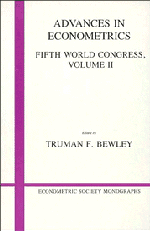Book contents
- Frontmatter
- 9 Econometric metaphors
- 10 Econometric methodology: a personal perspective
- 11 Making economics credible
- 12 The empirical analysis of tax reforms
- 13 Tests for liquidity constraints: a critical survey and some new observations
- 14 Life-cycle models of consumption: Is the evidence consistent with the theory?
- 15 A framework for relating microeconomic and macroeconomic evidence on intertemporal substitution
- 16 The short-run behaviour of labour supply
- 17 Some pitfalls in applied general equilibrium modeling
- 18 Operationalizing Walras: experience with recent applied general equilibrium tax models
16 - The short-run behaviour of labour supply
Published online by Cambridge University Press: 05 January 2013
- Frontmatter
- 9 Econometric metaphors
- 10 Econometric methodology: a personal perspective
- 11 Making economics credible
- 12 The empirical analysis of tax reforms
- 13 Tests for liquidity constraints: a critical survey and some new observations
- 14 Life-cycle models of consumption: Is the evidence consistent with the theory?
- 15 A framework for relating microeconomic and macroeconomic evidence on intertemporal substitution
- 16 The short-run behaviour of labour supply
- 17 Some pitfalls in applied general equilibrium modeling
- 18 Operationalizing Walras: experience with recent applied general equilibrium tax models
Summary
Introduction
Economists are at their most comfortable when analysing markets in which agents respond only to price signals. They can then call upon a mass of generally accepted theory and proceed with their analysis with the minimum of fuss. Since the labour market is one of the most important in the economy, it would make life much more straightforward if it could be convincingly demonstrated that in this market the interaction of demand and supply was essentially via the price mechanism. One part of such a demonstration would clearly have to involve the presentation of convincing evidence that labour supply fluctuations both in the short and the long run were generated, for the most part, by fluctuations in real wages. Obviously, we cannot allow the short run here to be too short; otherwise, we shall founder on the simple fact, gleaned from personal experience, that many employees work much harder in some weeks than in others without any noticeable change in their remuneration. Neither can we allow the short run to be too long; otherwise, we find ourselves unable to call upon the straightforward theory when confronted with major aggregate fluctuations. A year seems a reasonable length of time for the short run since most of us would be happy if annual fluctuations in labour supply were mainly generated by real wage shifts even if seasonal fluctuations, for example, were brought about by other means.
- Type
- Chapter
- Information
- Advances in EconometricsFifth World Congress, pp. 177 - 196Publisher: Cambridge University PressPrint publication year: 1987



